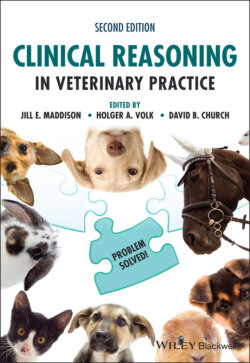Читать книгу Clinical Reasoning in Veterinary Practice - Группа авторов - Страница 61
Why is it important to differentiate primary from secondary GI disease?
ОглавлениеIt is important to determine whether primary or secondary GI disease is occurring in the vomiting or regurgitating animal, as much time and money can be wasted if the wrong system is investigated. As discussed in Chapter 2, the range of diagnoses to consider, diagnostic tools used and potential treatment or management options for primary, structural problems of a body system such as the GI tract are often very different compared to those relevant to secondary, functional problems of that system. Investigation of primary GI disease often involves some form of imaging modality (radiology, ultrasound, endoscopy and surgery) and/or biopsy. Routine haematology and biochemistry are often of little diagnostic value in GI disease, although they may give clues about the clinical status of the patient. In contrast, for secondary GI disorders, haematology, biochemistry and other tests are often critically important in progressing towards a diagnosis.
It is also important to appreciate that there are cases of primary GI disease causing vomiting, such as gastroenteritis caused by dietary indiscretion or other irritants, that can be safely treated symptomatically, as the cause is transient and will resolve within days without specific treatment. Symptomatic management such as withholding food, antiemetic treatment and/or dietary change is appropriate for these patients. However, there are few, if any, secondary GI causes of vomiting (such as liver disease, renal failure, hypoadrenocorticism and hypercalcaemia) where the cause is transient, which will respond to symptomatic treatment and/or will resolve without specific therapeutic intervention.
The uncommon secondary GI causes of regurgitation all cause megaesophagus (Table 3.2), so the clinical decision pathway leading to their diagnosis begins with the diagnosis of megaoesphagus by endoscopy or diagnostic imaging and then the search for a metabolic cause. As mentioned, symptomatic treatment of regurgitation without establishing the cause is not prudent.
Thus, the clinician’s clinical reasoning, in the consultation room, about whether primary or secondary GI disease is likely to be present is a crucial component of the rational management of patients reported to be vomiting or regurgitating and of clear communication with the client.
